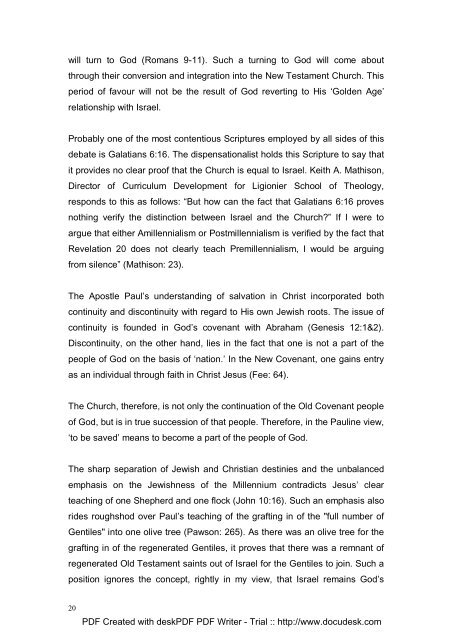A critical analysis of premillennial dispensationalism's interpretation ...
A critical analysis of premillennial dispensationalism's interpretation ...
A critical analysis of premillennial dispensationalism's interpretation ...
Create successful ePaper yourself
Turn your PDF publications into a flip-book with our unique Google optimized e-Paper software.
will turn to God (Romans 9-11). Such a turning to God will come about<br />
through their conversion and integration into the New Testament Church. This<br />
period <strong>of</strong> favour will not be the result <strong>of</strong> God reverting to His ‘Golden Age’<br />
relationship with Israel.<br />
Probably one <strong>of</strong> the most contentious Scriptures employed by all sides <strong>of</strong> this<br />
debate is Galatians 6:16. The dispensationalist holds this Scripture to say that<br />
it provides no clear pro<strong>of</strong> that the Church is equal to Israel. Keith A. Mathison,<br />
Director <strong>of</strong> Curriculum Development for Ligionier School <strong>of</strong> Theology,<br />
responds to this as follows: “But how can the fact that Galatians 6:16 proves<br />
nothing verify the distinction between Israel and the Church?” If I were to<br />
argue that either Amillennialism or Postmillennialism is verified by the fact that<br />
Revelation 20 does not clearly teach Premillennialism, I would be arguing<br />
from silence” (Mathison: 23).<br />
The Apostle Paul’s understanding <strong>of</strong> salvation in Christ incorporated both<br />
continuity and discontinuity with regard to His own Jewish roots. The issue <strong>of</strong><br />
continuity is founded in God’s covenant with Abraham (Genesis 12:1&2).<br />
Discontinuity, on the other hand, lies in the fact that one is not a part <strong>of</strong> the<br />
people <strong>of</strong> God on the basis <strong>of</strong> ‘nation.’ In the New Covenant, one gains entry<br />
as an individual through faith in Christ Jesus (Fee: 64).<br />
The Church, therefore, is not only the continuation <strong>of</strong> the Old Covenant people<br />
<strong>of</strong> God, but is in true succession <strong>of</strong> that people. Therefore, in the Pauline view,<br />
‘to be saved’ means to become a part <strong>of</strong> the people <strong>of</strong> God.<br />
The sharp separation <strong>of</strong> Jewish and Christian destinies and the unbalanced<br />
emphasis on the Jewishness <strong>of</strong> the Millennium contradicts Jesus’ clear<br />
teaching <strong>of</strong> one Shepherd and one flock (John 10:16). Such an emphasis also<br />
rides roughshod over Paul’s teaching <strong>of</strong> the grafting in <strong>of</strong> the "full number <strong>of</strong><br />
Gentiles" into one olive tree (Pawson: 265). As there was an olive tree for the<br />
grafting in <strong>of</strong> the regenerated Gentiles, it proves that there was a remnant <strong>of</strong><br />
regenerated Old Testament saints out <strong>of</strong> Israel for the Gentiles to join. Such a<br />
position ignores the concept, rightly in my view, that Israel remains God’s<br />
20<br />
PDF Created with deskPDF PDF Writer - Trial :: http://www.docudesk.com

















